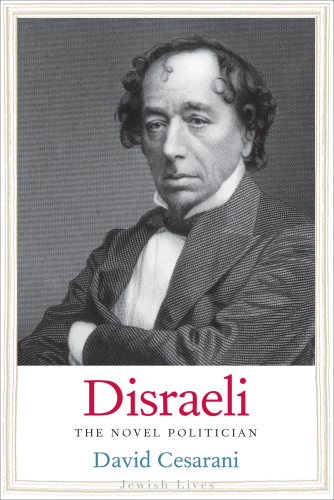
Disraeli
The Novel Politician
کتاب های مرتبط
- اطلاعات
- نقد و بررسی
- دیدگاه کاربران
نقد و بررسی

February 1, 2016
A well-documented life of the Victorian statesman and novelist Benjamin Disraeli (1804-1881) devotes much attention to his strong sense of being a Jew and an outsider. Reading this succinct life of Disraeli as a "transitional figure" between the old order and the modern is often troubling, as his own copious words in novels and polemics about race played right into the hands of the growing cadre of anti-Semites. As part of the publisher's Jewish Lives series, Cesarani (Director, Holocaust Research Centre, Royal Holloway, Univ. of London; Major Farran's Hat: The Untold Story of the Struggle to Establish the Jewish State, 2009, etc.) examines the question, what kind of a Jew was Disraeli? Indeed, from early on, he was a perfunctory Jew of Sephardic roots who was baptized as an adolescent by his father, an enlightened man of letters who had grown disenchanted with Jewish law and rabbinical authority and from whom Disraeli gleaned his literary bent and cosmopolitanism. "He was infused with a contempt of traditional Judaism and taught to think of Christianity as its worthier successor," writes the author. Playing the "Jewish trope" in his fictionalized portrayals--i.e., that Jews "gravitated to radical ideologies and subversive causes," that their resilience in outliving persecution honed their intelligence and made them privy to "subterranean agencies," and so on--made Disraeli a highly paradoxical figure as he began his move into the political realm and "respectability." A Tory by default, although more reactionary, plagued by chronic debt, married to a non-Jew, and hugely ambitious, Disraeli rose to become head of his party and a favorite of Queen Victoria. The author continually reveals how difficult it is to situate his legacy--such as in negotiating the purchase of the Suez Canal and mediating the Turkish-Russian crisis of 1878--outside of the anti-Semitic vitriol aimed at him and often extracted from his own words. A focused biography that derives its excellent specificity from Disraeli's writings.
COPYRIGHT(2016) Kirkus Reviews, ALL RIGHTS RESERVED.

March 6, 2006
To the Israeli prosecutor who interrogated him in 1961, Adolf Eichmann was a fanatical anti-Semite and a central figure in the annihilation of the Jews. To Hannah Arendt, he was a dim-witted bureaucrat, a cog in the machinery of destruction that was the Holocaust. British historian Cesarani, author of numerous books on the Holocaust and Jewish history, offers a more complex and nuanced portrait. Based on research into sources that were unavailable in the 1960s and on the most recent scholarly work on the Holocaust, Cesarani corrects the historical record on numerous issues. Contrary to popular myth, he says, Eichmann had a normal childhood and a socially and professionally successful young adulthood. Eichmann joined the SS not because he was a misfit but because, like so many German and Austrian middle-class men, he found the Third Reich a great engine of social mobility. Cesarani's biography is convincing on many counts. But in the end, the broad outlines of Arendt's portrait in her brilliant Eichmann in Jerusalem
remain standing. Eichmann may have been more intelligent and skilled than she concluded, but he was the perfect expression of the highly bureaucratized and systematic killing process that the Nazis perfected. 8 pages of b&w photos, 2 maps.

April 15, 2006
Cesarani (history, London Univ.) has written the most detailed, complete, and balanced biography of Eichmann in 40 years. Most works have concentrated solely on Eichmann's capture, trial, and execution during 1960 -62; however, Cesarani also focuses on his childhood, Nazi Party days, and exile in Argentina. The greatest strength of the book is the analysis refuting previous attempts to categorize Eichmann as an ordinary -desk clerk - just following orders. Cesarani states that -each generation has seen what it wanted to see in Eichmann -: to the Israelis, he was the personification of the evils of the Nazi system; to others, a victim of the totalitarian state, as in Hannah Arendt's "Eichmann in Jerusalem", or a mere robot, as in Harry Mulisch's "Criminal Case 40/61". In Cesarani's view, Eichmann was not predisposed to genocide; nor was he a blameless -cog - in the wheel of the Holocaust. Rather, he taught himself morally to accept and execute a genocidal plan. In the context of recent genocides (Darfur, Rwanda, Bosnia), Eichmann can be seen as neither unique nor banal but as a warning that anyone can become a "gé nocidaire". Recommended for academic libraries and Holocaust collections." -Maria C. Bagshaw, Lake Erie Coll., Painesville, OH"
Copyright 2006 Library Journal, LLC Used with permission.

Starred review from June 1, 2006
Since Adolf Eichmann's trial and execution, scholars have looked to the events of the Holocaust logistician's life to assess the depth of his guilt and to speculate on the social mechanisms that turn individuals genocidal. Cesarani aims to strip away some of the mythology that such efforts have invariably generated. His thesis--that Eichmann's evil arose not from banal bean counting but from the bureaucrat's ambitious careerism--both builds upon and pointedly rejects Hannah Arendt's visceral " Eichmann "in Jerusalem and will certainly attract attention for doing so. Yet Cesarani does more than simply reopen the cog-or-monster debates that surrounded Arendt's assessment. Pointing out key moments in which Eichmann overcame his own humanity--swallowing his initial shock at the sight of mass shootings and finding recovery from a "total moral collapse" in Hungary in 1944--Cesarani emphasizes Eichmann's deliberate choices, habituation to power, and gradual desensitization to mass atrocity. In doing so, he presents a compelling vision of Eichmann that comports with our current awareness of the psychological dynamics of genocide. Similarly compelling is Cesarani's fascinatingly Darwinian description of the ever-changing bureaucratic structures of Nazism to which Eichmann was continually adapting as he rose in the ranks. Few biographies, and fewer Holocaust histories, are as innovative or as nuanced.(Reprinted with permission of Booklist, copyright 2006, American Library Association.)

























دیدگاه کاربران